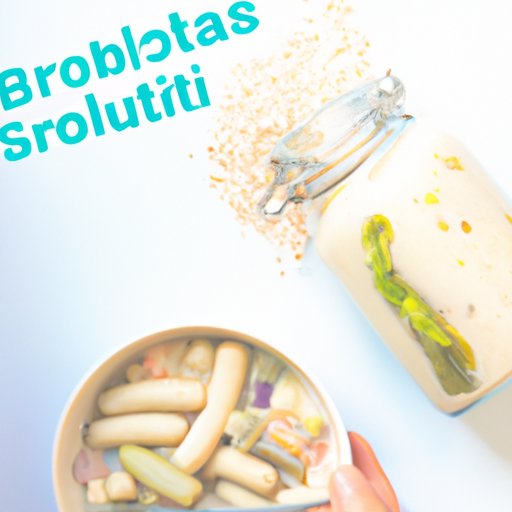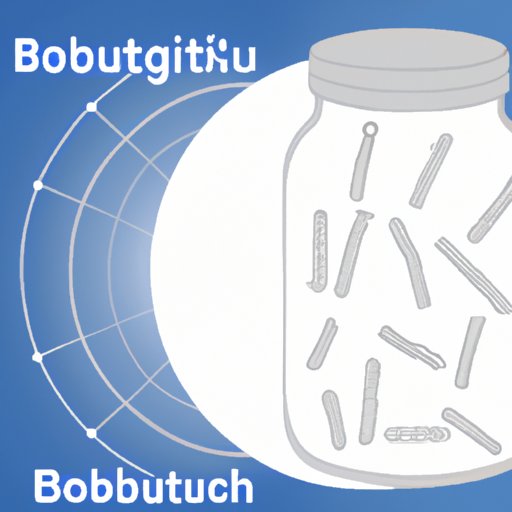Introduction
Probiotics have become increasingly popular in recent years, with many people turning to them as a way to maintain and improve their overall health. But what are probiotics exactly and how do they work? In this article, we’ll explore the science behind probiotics and answer the question: how does probiotics work?
Exploring the Science Behind Probiotics: How Do They Work?
In order to understand how probiotics work, it’s important to first understand what they are. Probiotics are live microorganisms, usually bacteria or yeasts, that can provide a range of health benefits when consumed.
These beneficial microorganisms can help restore the balance of good bacteria in the gut, which can help support the immune system, improve digestion, and even enhance mental health. So how do probiotics interact with our bodies to produce these effects? Let’s take a look.
When probiotics are consumed, they travel through the digestive tract where they interact with the cells lining the gut. This interaction triggers a number of beneficial changes, such as the production of helpful compounds like short-chain fatty acids, which can help protect against pathogens and support healthy digestion.
Probiotics can also help to modulate the immune system, by reducing inflammation and stimulating the production of antibodies. This can help to reduce the risk of infection and improve overall health.
Probiotics and Your Health: What You Need to Know
Now that we’ve explored how probiotics work, let’s take a look at some of the potential benefits of taking them. Regularly consuming probiotics has been shown to have a range of positive effects on health, including:
- Boosting the immune system
- Improving digestion
- Enhancing mental health
It’s important to note, however, that different types of probiotics may have different effects on the body. Therefore, it’s important to speak with your doctor or healthcare provider to determine which type of probiotic is right for you.
It’s also important to note that there is no “one size fits all” approach to taking probiotics. Different people will respond differently to different types and doses of probiotics, so it’s important to experiment to find what works best for you.

A Comprehensive Guide to the Benefits of Probiotics
Now that we’ve explored how probiotics work and the potential benefits they can offer, let’s take a look at some of the specific ways probiotics can benefit your health.
Boosting the immune system
Research suggests that regularly consuming probiotics can help to boost the immune system by increasing the production of antibodies, which can help to fight off infections and diseases. A study published in the journal Nutrients found that regularly consuming probiotics significantly increased the production of immunoglobulin A, an antibody that helps to protect against a range of infections.
Improving digestion
The beneficial bacteria found in probiotics can also help to improve digestion. Research suggests that probiotics can help to break down food more efficiently, reduce bloating, and improve overall digestive health.
A study published in the journal Gut found that taking a daily probiotic supplement improved symptoms of irritable bowel syndrome (IBS) in participants, with significant improvements in abdominal pain, bloating, and stool frequency.
Enhancing mental health
Finally, research suggests that regularly consuming probiotics can also help to improve mental health. A study published in the journal Psychiatry Research found that taking a daily probiotic supplement significantly reduced symptoms of depression in participants.
The researchers suggested that this effect may be due to the ability of probiotics to reduce inflammation, which has been linked to depression and other mental health conditions.

The Role of Probiotics in Digestive Health
Now that we’ve explored the potential benefits of probiotics, let’s take a look at how they can help to improve digestive health.
The beneficial bacteria found in probiotics can help to break down food more efficiently, reduce bloating, and improve overall digestive health. Additionally, probiotics can help to restore the balance of good bacteria in the gut, which can help to protect against pathogens and support healthy digestion.
When choosing a probiotic supplement, it’s important to choose one that contains a variety of different types of beneficial bacteria. Some of the most common types of probiotics include:
Bifidobacterium
Bifidobacterium is a type of probiotic bacteria that is naturally found in the gut. It has been shown to help reduce inflammation, improve digestion, and support the immune system.
Lactobacillus
Lactobacillus is a type of probiotic bacteria that is commonly found in fermented foods like yogurt. Studies suggest that it can help to improve digestion, reduce inflammation, and support the immune system.
Saccharomyces boulardii
Saccharomyces boulardii is a type of probiotic yeast that has been shown to help reduce inflammation and improve digestion. It is often found in supplements and can be taken alongside other probiotics.
Conclusion
In conclusion, probiotics are beneficial microorganisms that can help to maintain and improve overall health. By restoring the balance of good bacteria in the gut, probiotics can help to support the immune system, improve digestion, and enhance mental health. When choosing a probiotic supplement, it’s important to choose one that contains a variety of different types of beneficial bacteria, such as Bifidobacterium, Lactobacillus, and Saccharomyces boulardii.
It’s also important to speak with your doctor or healthcare provider to determine which type and dose of probiotic is right for you. With the right probiotic supplement, you can enjoy a range of health benefits and take steps towards improving your overall wellbeing.
(Note: Is this article not meeting your expectations? Do you have knowledge or insights to share? Unlock new opportunities and expand your reach by joining our authors team. Click Registration to join us and share your expertise with our readers.)
